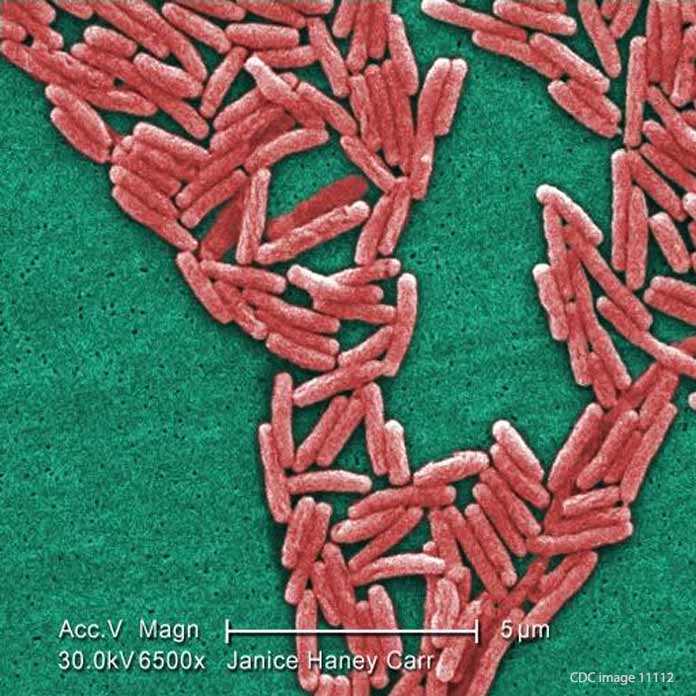Allegheny General Hospital officials have now revealed that a cancer patient did in fact acquire potentially life-threatening Legionnaires’ disease from contaminated water at their 631-bed facility. 2 other possible cases of hospital-acquired Legionnaires’ disease are currently being investigated; 1 of these patients has since succumbed to an “unrelated illness,” according to Allegheny Health Network spokesperson Dan Laurent. (1)

On June 14th, the hospital – renowned for its cancer center and listed by Truven Health Analytics as one of the “100 Top Hospitals” in the U.S. – announced that it was expanding testing of its water system after positive cultures of Legionella pneumonia bacteria were found in two water tanks supplying its outpatient cancer center and Snyder Pavilion, its main inpatient facility.
The tests were initiated after a cancer patient was admitted by the hospital’s emergency department on May 6 with a respiratory ailment. Although the patient was discharged on May 20th, s/he was readmitted four days later. At this time, a urine test revealed that the patient had Legionnaires’ disease.
This patient was, according to Mr. Laurent, “effectively treated.” (1)
After initial tests revealed Legionella in the water system, the hospital closed all drinking water sources on floors 4 through 12 of Snyder Pavilion, issuing bottled water and telling immune-compromised patients not to bathe or shower. Hospital spokesperson Dan Laurent told media that
“Out of extra precaution, however, we have also employed the special pathogens lab to conduct additional testing of the hospital’s water system, including more than 130 additional cultures … So we expect contingency operations at the hospital to continue for the near future while this additional testing is completed.” (2)
However, in its June 14th announcement, officials claimed that they did not believe that the patient had contracted the Legionella bacteria at Allegheny General Hospital.
Now, though, environmental testing and examination of a sputum sample from the cancer patient have confirmed that the Legionella bacteria found at the hospital and in the patient match – both were Legionella pneumophilia serogroup 5. Identical DNA patterns were also observed through pulse-field gel electrophoresis (PFGE) performed by Special Pathogens Laboratory.
Sputum tests were not performed on the two other possible victims, although urinary antigen tests revealed that they had contracted a common variety of Legionella pneumonia bacteria, serogroup 5. According to Dr. Janet Stout, Director of Special Pathogens Laboratory, environmental testing of the water at Allegheny General Hospital “… also found Legionella from serogroup 1, so, the two other patients could have contracted Legionnaires’ during stays in the hospital in May, too … ‘But without sputum samples, we just will never know for sure. That’s why we say it’s “possible” or “probable”.’” (3)
Hospital-acquired Legionnaires’ Disease
Legionnaires’ disease is a severe pneumonia that is particularly dangerous for people over 50, are smokers, are immune-compromised, and / or have underlying medical conditions such as respiratory disease / COPD, cancer, or diabetes. It is contracted by breathing water vapor or aspirating contaminated potable water into the lungs; common sources include hot tubs, cooling towers, and poorly maintained heating / cooling systems. Initial symptoms, which present within 2 to 14 days of exposure to the bacteria, include chills, high fever, fatigue, cough, muscle aches, headaches, and confusion / hallucinations.
When Legionnaires’ disease strikes within a healthcare environment like a hospital, retirement home, or acute-care center, it can be fatal in ~50% of cases.
Sources:
- Schmitt, Ben. “Legionnaires’ disease in cancer patient likely hospital-acquired.” TribLive. Web. 1 Jul. 2016.
- Schmitt, Ben. “Allegheny General Hospital expands testing for Legionella.” TribLive. Web. 29 Jun. 2016.
- Hamill, Sean D. “Testing finds an AGH patient contracted Legionnaires’ disease at the hospital in May.” Pittsburgh Post-Gazette. Web. 2 Jul. 2016.